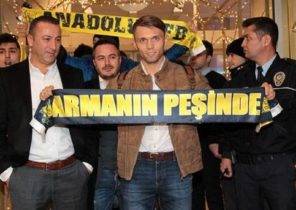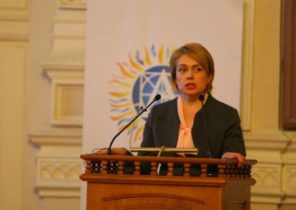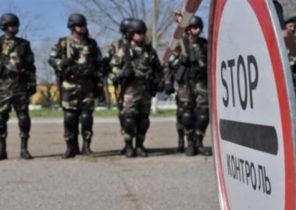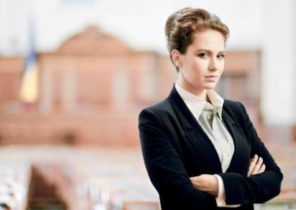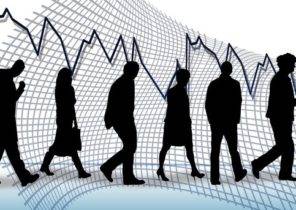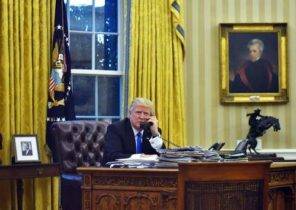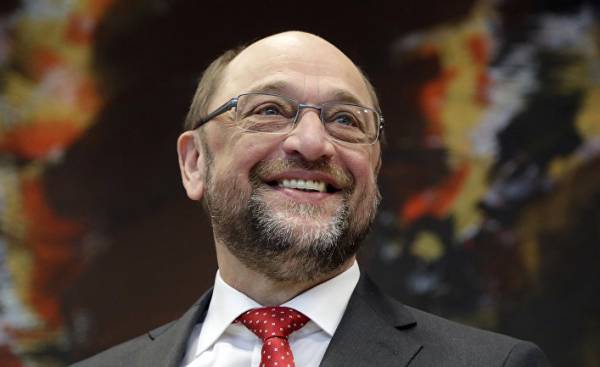
Berlin — to occupy the post of Chancellor, the social Democrats need a partner. If they will be “green” and liberals, the relations of Berlin with Moscow is even more messed up. Who is betting the SPD?
A little over five months left until the parliamentary elections in Germany, the outcome of which depends on who will hold the position of Chancellor. Angela Merkel (Angela Merkel) intends to retain the post of Prime Minister, her social democratic rival, Martin Schulz (Martin Schulz) wants to sit in the armchair of the Chancellor. How is he going to achieve this goal?
Castling inside the coalition
The nomination of Schulz, candidate for the Chancellor and his unanimous (!) the election of the Chairman of the Social democratic party of Germany (SPD) inspired party that was a long time in the political depression. The rating of the social Democrats has increased.
If the elections on 24 September, they will bypass the conservatives of Angela Merkel from the party CDU/CSU, the fact that the social Democrats will be able to apply for the position of Chancellor. However, to form a single-party government in the context of German political realities, they will not succeed.
Neither the SPD nor the CDU/CSU are not likely to obtain in the elections, and therefore in Parliament, an absolute majority. But Schultz could be in this case to resume the so-called “Grand coalition” with the conservatives, having traded with them roles — from Junior to senior partner.
This option is the offset of Angela Merkel as head of the Cabinet of Ministers shall be submitted to the social Democrats the most reliable. According to surveys, moreover, he remains the only one possible. For five months, however, the mood of voters can change, so to calculate the SPD and replacement options.
Motley Bundestag
The Bundestag of the next convocation will most likely be more colorful. Additionally, now it is four parties (CDU/CSU, the SPD, “the Union-90″/”Green” and the post-Communists of the Left party) has high chances to overcome the five percent barrier have populists of the “Alternative for Germany” (ADH). Obviously, going back to the Bundestag liberals of the Free democratic party (FDP), leaking current legislature period because of the failure in the previous elections.
So liberals turned their attention to the social-Democrats in recent days. Schultz is going to meet personally with the Chairman of the FDP, Christian Lindner (Christian Lindner), calls a “remarkable” failure of the liberals from the fixation on purely tax election topics, fondly remembers the reign of the German social-liberal coalition, which, he said, made the country “more modern and democratic.”
Thanks to the liberals in 1969, the Chancellor of Germany was Willy Brandt (Willy Brandt), and later Helmut Schmidt (Helmut Schmidt). The coalition of social Democrats with them have lasted 13 years. In 1982 the FDP, which was called the “small appendage”, defected to the conservatives, a couple of which — with a small break — the rules to 2013.
Compliments to the liberals
Can this year of the FDP to become a “makeweight” for Schultz? “Mr Lindner is trying to hold the skirt of Mrs. Merkel, and builds bridges to other parties”, — said the leader of the SPD faction in the Bundestag Thomas Opperman (Thomas Oppermann).
Compliments of the social Democrats, liberals are not random. They sounded after the land elections in Saar on 26 March, the results of which became the SPD for an unpleasant surprise. Analysts explain the failure of the party to the fact that during the election campaign the social Democrats flirted with the local post-Communists. The possible participation of the Left party of the land government, voters didn’t like. Martin Schulz obviously took into account the lesson of the Saar and tries to make it so that public debate is not reduced to the alternative — either Merkel or Schultz in Alliance with the post-Communists and “green”.
Supposedly there is also a variant of the so-called “traffic light”, that is, a coalition of “red” social Democrats, the greens and liberals, whose political color is yellow. German sociologists believe that the day of the election overall rating of the three parties may well exceed 50 percent.
“Traffic light” and relations with Russia
A “traffic light” are already working in the Federal state of Rhineland-Palatinate. And “green” and liberals labeled, of course, and in the Central government. But get along if they and others at the same table in the Cabinet of Martin Schulz?
Both of these parties binds strong mutual dislike. But it is based, rather, cultural incompatibility, not ideological. In matters economic, energy or social policy position “green” and liberals do vary greatly. But in terms of, for example, personal rights and freedoms, family and marriage, or foreign policy, the “green” and the FDP a lot in common.
So, both parties sharply critical of the Kremlin’s actions both domestically and on the world stage, in favour of a hard line towards Russia, are not inclined, in contrast to social Democrats and conservatives — to pragmatism and compromise.
According to tradition, in the German coalition government as Vice-Chancellor and Minister of foreign Affairs, usually gets the lesser of the partners. This means that, subject to implementation at the Federal level for the project “traffic light” of the German foreign Ministry will be headed by either the green party or a liberal. And in that and in other case we can expect a further cooling of German-Russian relations.
